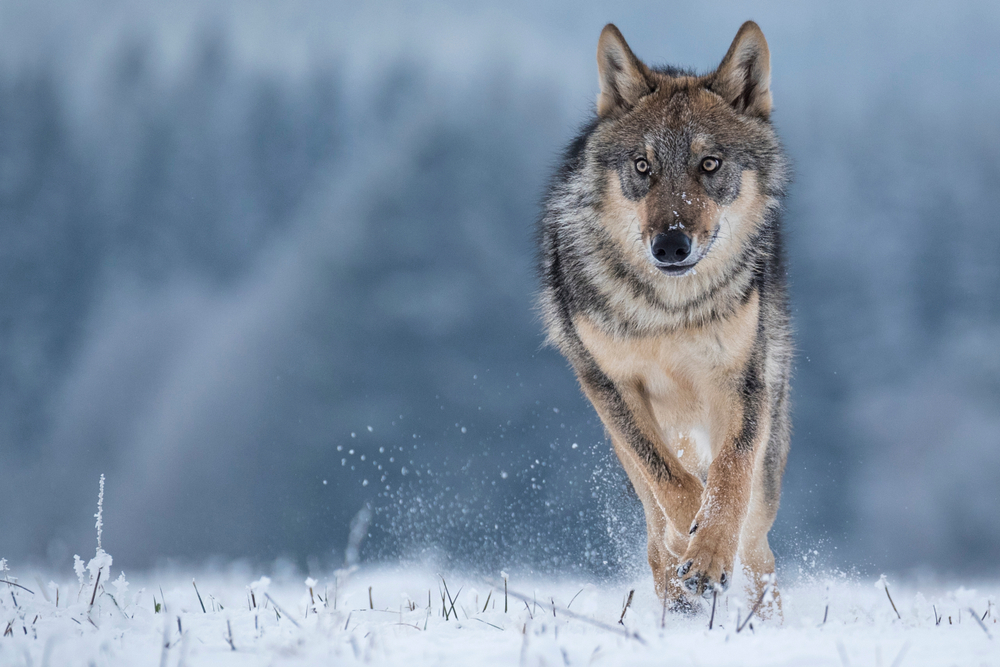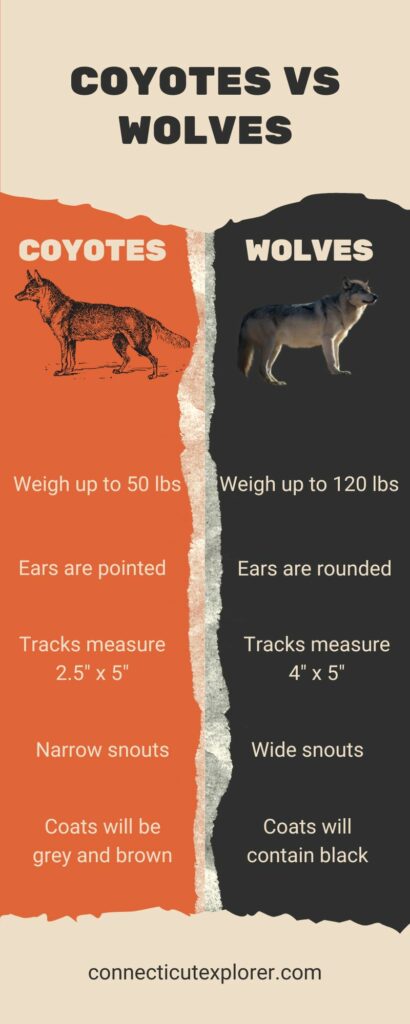I’m sure you’ve seen it on social media – someone swearing they’ve just seen a wolf; refusing to believe it was anything else. So, you’ve taken to the internet to find out for sure if there are wolves in CT.
In this article, you’ll find out whether or not there are actually any wolves in CT.
You’ll also get some other helpful information on the other wild dogs you might find in this beautiful state.

Are there wolves in CT?
Wolves, while once prevalent, are no longer found in Connecticut. They were hunted to extinction in the late 1700s.
People still report wolf sightings in Connecticut, though, and this is likely a case of mistaken identity due to them sharing some similar features with coyotes.
Wolves generally live and hunt in packs of 6-10. Coyotes, on the other hand, often live in packs but hunt alone.
So, if the animal you’ve seen was alone, that’s an indicator that it was not a wolf.
Wolves can be found in Canada and, if there is a shortage of food, may travel up to 500 miles from their home.
This would make it technically possible for a wolf sighting in CT, but extremely unlikely taking into consideration the other factors mentioned.
In 2007, a grey wolf was killed about 45 miles north of the Connecticut border, in Massachusetts. The species of the animal killed was verified through DNA testing.
This was such a rarity that it made the local papers – and there have been no more verified wolf sightings anywhere near Connecticut since then.
How to tell a coyote from a wolf
There are several different ways you can tell a coyote apart from a wolf.
- Size: Wolves are roughly 1 ft taller and 1-2 ft longer than coyotes
- Color: Wolves’ coats may contain black pigmentation, whereas coyotes’ coats will be grey and brown
- Snout: Coyotes have a more narrow snout than wolves
- Ears: Wolves have rounded ears and coyotes have tall, pointed ears
- Tracks: Wolf tracks will measure 4″ x 5″, while coyotes tracks will measure roughly 2.5″ x 2″
- Weight: Wolves can weigh up to 120 lbs and coyotes can weigh up to 50 lbs
You see from this list that wolves are simply much larger animals and have some features that distinguish them from their smaller canine counterparts.

When did wolves go extinct in Connecticut?
There is a story that in 1742 a young man named Isreal Putman killed the last wolf in Connecticut in the town of Pomfret.
It is said that this last wolf was successful in evading traps to kill more than 70 sheep and goats on the local farms.
While it’s unlikely this was actually the last wolf in Connecticut, we were unable to find any newspaper articles from the 1800s on forward that mention wolf sightings or killings in this state.
In fact, descriptions of wolves found in the western states were often published in Connecticut newspapers in the 1800s as residents here were simply not familiar with the animals.
Wolves were plentiful in Connecticut prior to the arrival of the settlers, but maintaining livestock became too difficult and they were hunted until there were none left.
Are there coywolves in CT?
Coywolves are a genetic mix of wolves and coyotes and are also called “eastern coyotes”.
They are slightly larger than western coyotes and are a relatively new species in the state, filling the gap in the food chain where wolves once laid claim.
They are found from New Jersey up to Maine. So, yes, there are coywolves in CT.
There is also some evidence that the eastern coyotes (coywolves) that are spotted in urban areas of Connecticut have also interbred with domestic dogs.
This is likely how they adapt so easily to urban life and why we see them so often in our cities.
So, there you have it, the answer to whether or not there are wolves in CT.
If you see something, or someone tells you they’ve seen something, that looks like a wolf in Connecticut, there’s almost no chance that it was actually a wolf.
What you/they saw was far more likely a stray dog, a fox, or a coyote.
5-10-2023 at 1:30 tonight just saw a wolf pass through my backyard in Bridgeport black and gray coat 100 lb easily so either it was a wolf or coyotes are doubling in weight